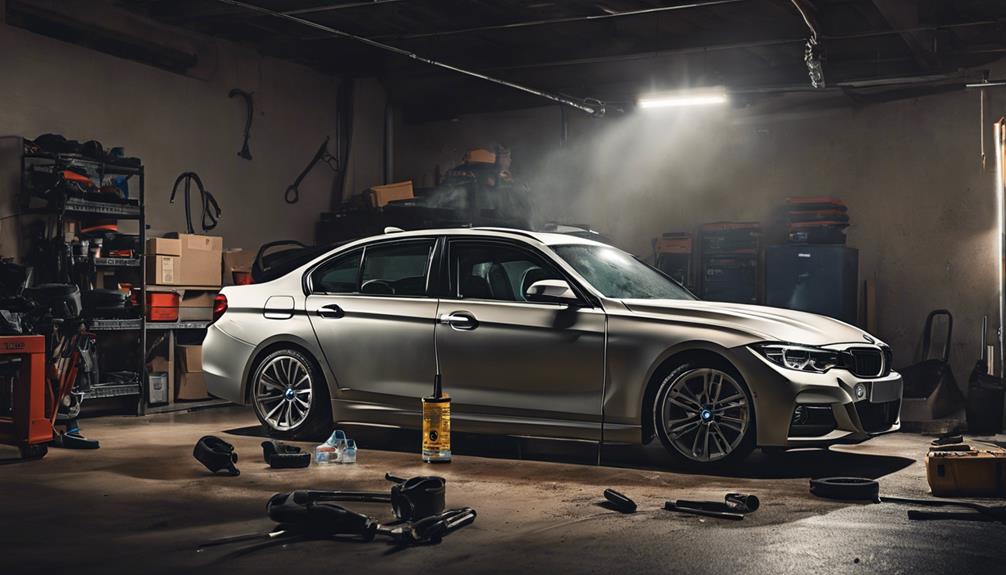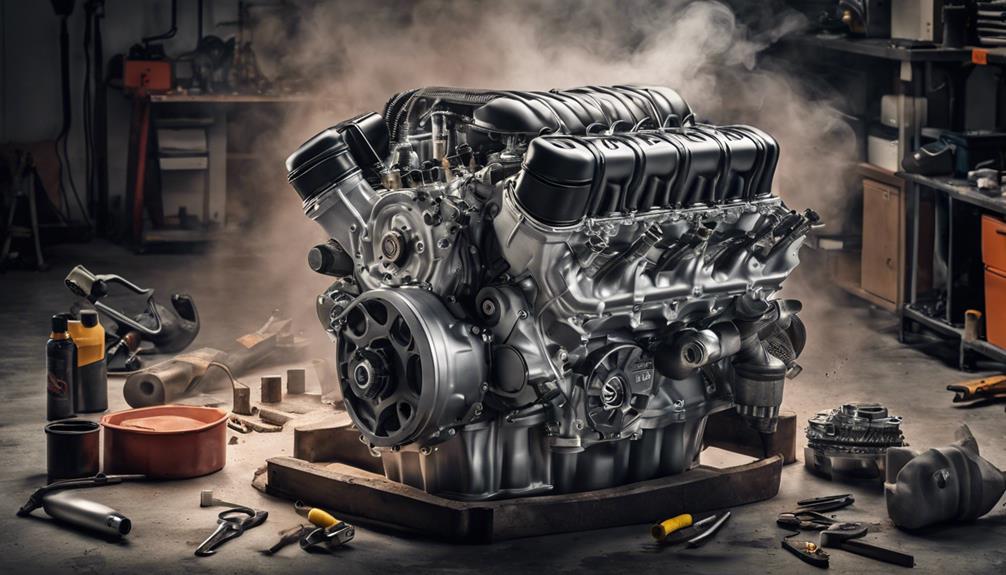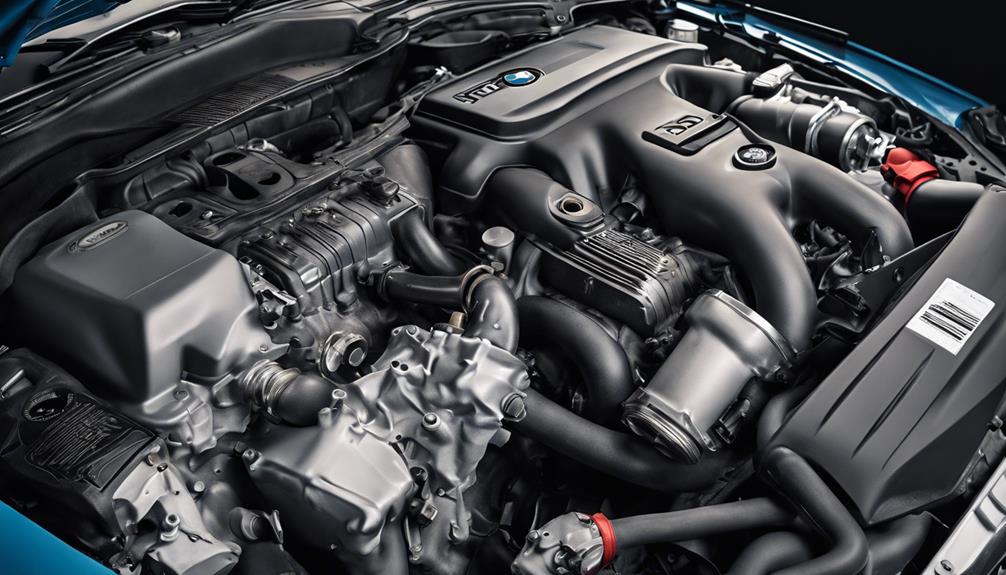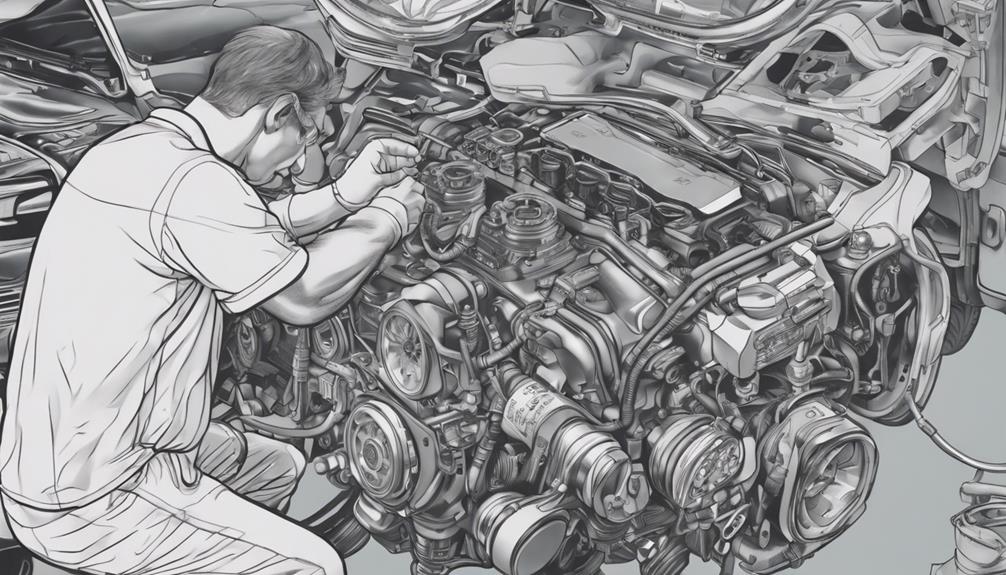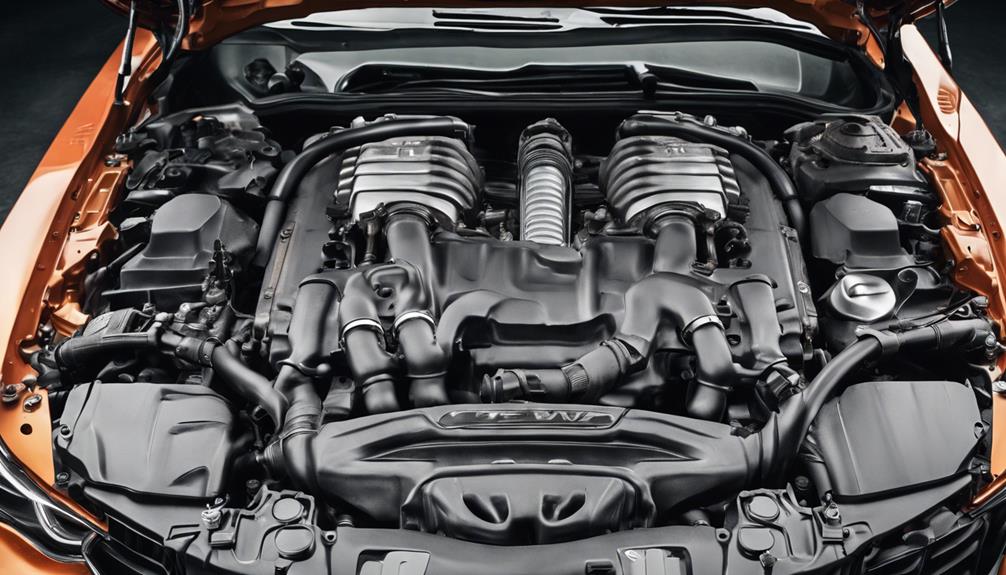If you're driving a BMW 340i, be prepared for a journey dealing with coolant system challenges, water pump hiccups, and oil system theatrics that may demand your car's full attention to avert potential breakdowns. The coolant system may play tricks on you with gradual losses due to faulty seals, while water pump failures can lead to overheating drama. Keeping an eye on oil system concerns like filter disintegration and leaks is key to preventing engine woes. The B58 engine's reliability shines through, but understanding maintenance costs and tips can save you from unpleasant surprises. Master these initial pitfalls, and your BMW 340i ownership might just cruise smoothly.
Key Takeaways
- Coolant system issues can lead to overheating and engine damage.
- Water pump failures are common, causing coolant leaks and overheating.
- Oil system concerns include filter disintegration and leaks.
- Regular maintenance and prompt repairs are crucial for engine health.
- The B58 engine in BMW 340i shows improved reliability compared to previous models.
Coolant Loss Issues

If you're a BMW 340i owner experiencing coolant loss problems, you're not alone in facing this frustrating issue that can potentially lead to overheating and engine damage. One possible culprit behind this coolant loss in your BMW 340i could be the coolant cap. The speculation revolves around the importance of the airtightness of the coolant cap. A faulty seal on the cap may result in a gradual loss of coolant, eventually leading to overheating issues if left unresolved. Ensuring that the coolant cap is properly sealed and functioning correctly is vital in preventing coolant loss and maintaining the best performance of your BMW 340i.
Regularly checking the coolant cap for any signs of wear or damage can help you catch potential issues early on. In some cases, replacing the coolant cap with a high-quality, airtight one could be a simple solution to combat coolant loss problems in your BMW 340i. Remember, addressing coolant loss promptly is key to avoiding more severe consequences like engine damage.
Water Pump Failures
Water pump failures are a prevalent issue in BMW 340i models, often stemming from the pump's design and materials used. If left unchecked, these failures can lead to serious consequences like overheating and engine damage.
Keeping an eye out for symptoms like coolant leaks and monitoring coolant levels can help catch water pump issues early.
Causes of Failures
When addressing causes of failures in the BMW 340i, it becomes evident that the design of the electric water pump plays a significant role in potential malfunctions. The electric water pump in the BMW 340i is responsible for circulating coolant throughout the engine to maintain ideal operating temperatures. However, due to design flaws, these water pumps can experience premature wear and ultimately fail, leading to issues such as overheating and coolant leaks. To give you a clearer picture, here's a table illustrating the impact of water pump failures:
| Effects of Water Pump Failures |
|---|
| Overheating |
| Coolant Leaks |
| Engine Damage |
| Costly Repairs |
Being aware of these causes can help you stay ahead and address any water pump issues promptly to avoid further complications.
Symptoms to Watch
In the domain of BMW 340i maintenance, attentiveness towards subtle indicators plays a crucial role in detecting potential water pump failures early on. Keeping an eye out for symptoms like coolant leaks, a low coolant warning, or engine overheating can save you from the headache of dealing with overheating issues and costly engine repairs.
If you notice a grinding noise or see the temperature gauge spiking, it might be a sign of a failing water pump. Ignoring these signs could result in severe damage to your BMW 340i's cooling system and even lead to a loss of power.
Coolant Hose Problems
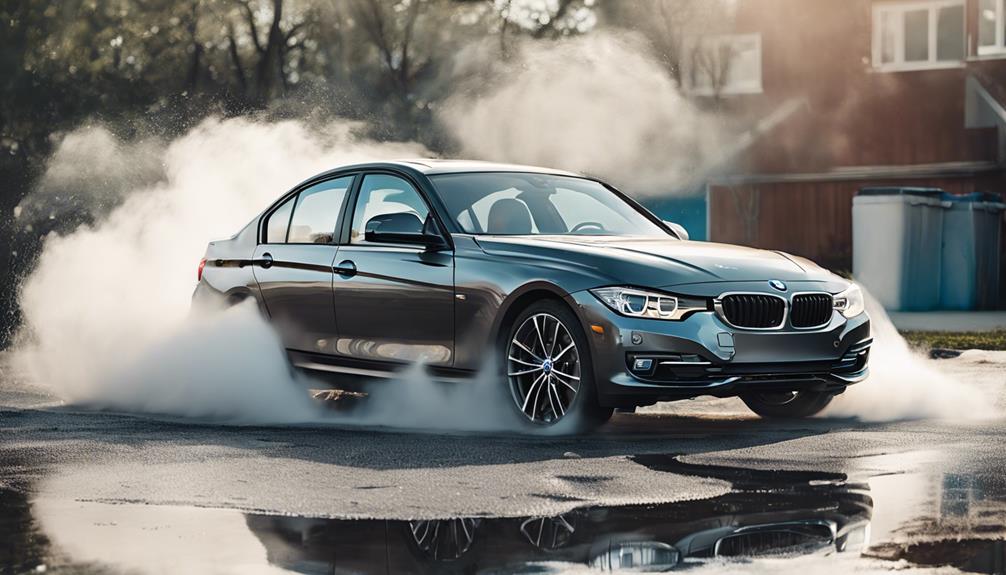
To address the coolant hose problems in your BMW 340i effectively, staying vigilant for signs of wear or leaks is vital. Coolant hose issues can result in a loss of coolant, potentially leading to engine overheating and damage. Common indicators of coolant hose problems include visible leaks under the car or in the engine bay. Regularly inspecting the coolant hoses for any wear, cracks, or leaks is essential in preventing these issues. If you notice any signs of damage, it's advisable to replace the affected coolant hoses promptly to maintain proper cooling system function and prevent overheating.
| Signs of Coolant Hose Issues | Actions to Take |
|---|---|
| Visible coolant leaks | Inspect hoses for wear |
| Engine overheating | Replace damaged coolant hoses |
| Loss of coolant | Check hoses for cracks |
| Coolant under the car | Address leaks promptly |
Oil Filter Disintegration
Oil filters in the BMW 340i are prone to disintegration, posing a risk of engine contamination and damage if not addressed promptly. The common issue of oil filter disintegration can lead to filters tearing apart during operation, allowing harmful contaminants to infiltrate the engine.
To mitigate this problem, following proper oil and filter change intervals is essential. By scheduling timely oil changes, you not only prevent engine corrosion but also steer clear of the costly repairs associated with oil filter disintegration. Regular maintenance acts as a shield against this issue, safeguarding your BMW 340i's engine health.
Oil Leaks

Experiencing oil leaks in your BMW 340i B58 can be an indication of underlying issues that demand prompt attention to maintain peak engine performance and longevity. When dealing with oil leaks, addressing them swiftly is vital to prevent any potential damage to your engine. Here are some key points to keep in mind:
- Valve Cover Gasket: This component is a common source of oil leaks in the BMW 340i B58. Look out for signs like a burning oil smell, soaked spark plugs, or a low oil light.
- Oil Filter Housing: Leaks in the oil filter housing can occur due to filter disintegration, which may result in contaminants entering the engine.
- Timely Replacement: Regularly replacing the valve cover gasket and monitoring oil levels can help prevent significant leaks and potential engine damage.
- Maintenance is Key: Monitoring oil leaks and addressing them promptly is crucial for ensuring the continued performance and longevity of your BMW 340i B58 engine.
Valve Cover Gasket Leaks
Frequent maintenance checks on your BMW 340i B58 can help detect early signs of valve cover gasket leaks, ensuring peak engine performance and longevity. Valve cover gasket leaks in the B58 engine typically rear their oily heads between 60,000-100,000 miles. Keep an eye (and nose) out for a burning oil smell, soaked spark plugs, or that pesky low-oil warning light – all potential indicators of trouble brewing in the rubber gaskets department. The extreme heat cycles that the rubber gaskets endure make them prone to wearing out faster than your favorite pair of sneakers. Stay ahead of the game by spotting leaks early to prevent major oil spills that could leave your engine parched. Luckily, BMW's B58 engine comes equipped with a heat retention system designed to ease the strain on these gaskets and extend their lifespan. Remember, a little vigilance goes a long way in keeping those leaks at bay.
| Signs of Valve Cover Gasket Leaks | Mileage Range | Importance |
|---|---|---|
| Burning oil smell | 60,000-100,000 miles | Early detection critical |
| Soaked spark plugs | 60,000-100,000 miles | Indicates potential leak |
| Low-oil warning light | 60,000-100,000 miles | Check gaskets ASAP |
Oil Filter Housing Leaks
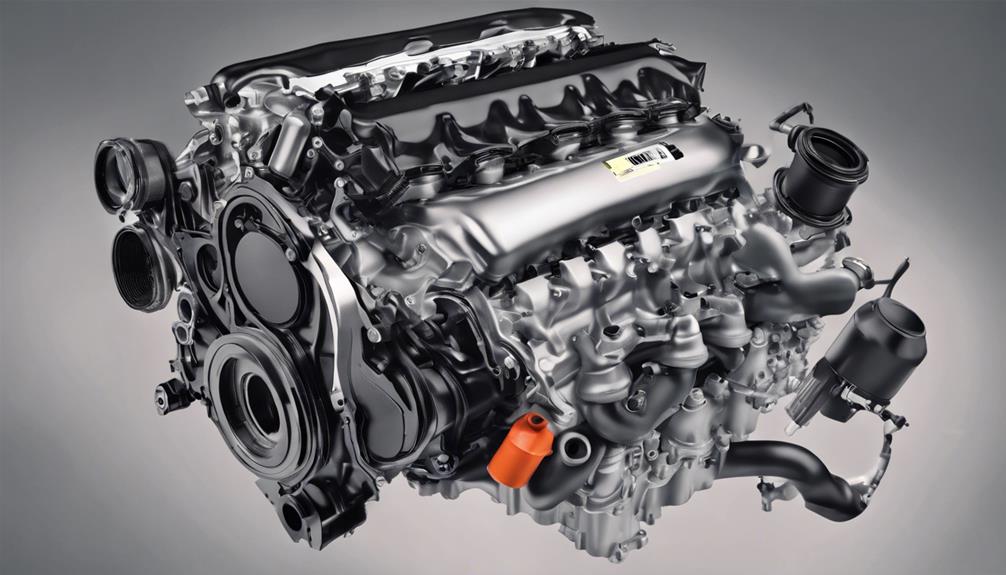
If you've noticed oil pooling under your BMW 340i or a drop in oil levels, you might be dealing with an oil filter housing leak.
These leaks can stem from gasket failures, housing cracks, or installation mishaps.
Addressing this issue promptly is key to preventing engine woes and ensuring your car stays well-lubricated.
Common Causes of Leaks
Constructed from plastic, the oil filter housing in BMW 340i models is prone to developing leaks over time. The plastic material can deteriorate, leading to cracks and oil seepage. Here are some common causes of these leaks:
- Age and heat exposure can make the plastic housing brittle.
- Inadequate maintenance may result in gasket failure.
- Over-tightening the housing during installation can cause stress fractures.
- Poor quality oil filters can put additional strain on the housing.
- Engine vibrations and movements can contribute to the development of cracks.
Addressing these issues promptly can help maintain the health of your BMW 340i's engine and prevent costly repairs down the line.
Impact on Engine
Experiencing oil filter housing leaks in your BMW 340i can have a significant impact on the engine's performance and longevity. If left unattended, oil seepage from these leaks can lead to engine damage, compromising the overall health of your vehicle. Common signs such as oil spots under the car, low oil levels, or a burning oil smell indicate the presence of this issue. Addressing these leaks promptly is essential to prevent engine contamination and maintain proper lubrication. Regular inspection and maintenance of the oil filter housing are vital to avoid costly repairs and guarantee peak engine performance. Take action to safeguard your BMW 340i against the detrimental effects of oil filter housing leaks.
| Impact on Engine | |
|---|---|
| Potential Engine Damage | Address Promptly |
| Oil Seepage | Prevent Contamination |
| Low Oil Levels | Maintain Lubrication |
| Burning Oil Smell | Ensure Longevity |
Repair Options Available
To address oil filter housing leaks in your BMW 340i, you have various repair options available to prevent further damage and maintain engine health. Here are some alternatives to ponder:
- Replace the gasket to seal the oil filter housing effectively.
- Opt for replacing the entire housing unit for a more thorough fix.
- Ponder using a professional installation service for proper sealing and long-term leak prevention.
- DIY repair kits can be a cost-effective solution, but ensure proper installation for efficacy.
- Regularly inspect the oil filter housing and gasket integrity to catch leaks early and avoid potential engine overheating or damage.
Oil Pan Gasket Leaks

Oil pan gasket leaks in your BMW 340i can cause significant issues due to exposure to high temperatures and oil contaminants. These leaks can lead to oil spots under the vehicle, low oil levels, and a burning oil smell, indicating a serious problem.
When left unaddressed, oil pan gasket leaks may result in engine damage, oil starvation, and even safety hazards on the road. To tackle this issue, it's vital to promptly repair the gasket by removing the oil pan, cleaning the surfaces thoroughly, and installing a new gasket to prevent further leaks.
Regular inspection and maintenance of the oil pan gasket, along with components like the fuel pump and timing chain, can help avoid leaks and maintain excellent engine performance in your BMW 340i. Stay proactive in addressing oil pan gasket leaks to keep your driving experience smooth and worry-free.
Long-Term Durability Assessment
Evaluating the long-term durability of your BMW 340i involves examining wear and tear patterns, engine reliability, and potential maintenance costs.
You'll find that the B58 engine's reputation for enhanced reliability offers promising prospects for lasting performance with proper care.
As you evaluate the longevity of your 340i, keep an eye on how maintenance needs and costs may evolve over time.
Wear and Tear
In evaluating the long-term durability of the BMW 340i regarding wear and tear, consistent monitoring of components like seals, tubing, and cooling systems is vital. Here are some key points to ponder:
- Gaskets: Over time, gaskets may deteriorate, leading to potential leaks and decreased performance.
- Hoses: Regularly inspect hoses for any signs of wear or cracks that could result in coolant leaks.
- Cooling System: Keep an eye on the coolant tank and verify proper levels to prevent overheating issues.
- Seals: Examine seals for any wear or damage that could impact the overall performance of the vehicle.
- Maintenance: Scheduled upkeep is essential to address wear and tear issues proactively and sustain the BMW 340i's longevity.
Engine Reliability
Monitoring the long-term reliability of the BMW 340i's engine presents an essential aspect of evaluating its durability. The B58 engine, commonly found in the 340i, has shown remarkable improvement in reliability compared to its predecessors, the N54 and N55 engines. Despite being relatively new, the B58 engine is known for its robust performance and enhanced durability. Initial assessments indicate that the B58 engine meets Toyota's stringent reliability standards. Below is a table summarizing key points about the B58 engine's reliability:
| BMW B58 Engine Reliability | |
|---|---|
| Age | New |
| Performance | High |
| Reliability | Improved |
| Comparison | N54, N55 |
| Assessment | Positive |
The B58 engine showcases common reliability and promises improved longevity for BMW 340i drivers.
Maintenance Costs
When considering the long-term durability of your BMW 340i, one key aspect to analyze is the maintenance costs associated with routine upkeep. Here are some insights to help you navigate the world of maintenance expenses:
- Fuel System: Regular maintenance of the fuel system, including fuel filter replacements and injector cleaning, can help guarantee efficient fuel delivery and engine performance.
- VANOS Solenoid: Monitoring and potentially replacing the VANOS solenoid can aid in maintaining proper variable valve timing functionality, essential for engine efficiency.
- Service Intervals: Adhering to scheduled service intervals outlined in your owner's manual can prevent costly repairs down the road.
- Regional Costs: Consider regional service cost variations when budgeting for routine maintenance.
- Extended Warranty: Exploring extended warranty options may provide financial security against unexpected maintenance expenses.
Reliability of the B58 Engine
The reliability of the B58 engine, introduced in 2016, has garnered attention for its notable improvements over previous BMW engines. Known for its enhanced performance and durability, the B58 engine stands out as a more reliable option compared to its predecessors, the N54 and N55 engines.
With advancements in valve timing and overall design, the B58 engine offers a smoother and more efficient power delivery, showcasing BMW's commitment to engineering excellence. While the long-term reliability of the B58 engine is still under evaluation, enthusiasts appreciate its potential for high performance through tuning and upgrades.
However, some challenges exist, such as the replaceability of Vanos solenoids, which can be tricky due to the rear-mounted timing chain setup. Despite these considerations, the B58 engine represents a step forward in BMW's engine development, promising a blend of power, reliability, and driving enjoyment.
Frequently Asked Questions
What Is the Common Failure of B58?
If you're wondering about the common failure of the B58 engine, it's often the VANOS solenoid issues due to o-ring degradation. Symptoms like power loss and rough idle could signal this problem.
Is a BMW 340i a Good Car?
You'll find the BMW 340i to be a fantastic car, blending luxury with performance seamlessly. Its potent B58 engine delivers power and reliability, perfect for both daily driving and spirited adventures. Enjoy the ride!
Is BMW B58 Engine Reliable?
Yes, the BMW B58 engine is reliable. It's a leap forward from older BMW engines, showing promise for longevity. With proper care, it's expected to exceed 200,000 miles without major issues, making it a solid choice.
How Many Miles Do 340i Last?
With proper care, your BMW 340i can last well over 100,000 miles. Owners have seen their vehicles reach 150,000 to 200,000 miles without major issues. Regular maintenance and timely repairs are key for longevity.





